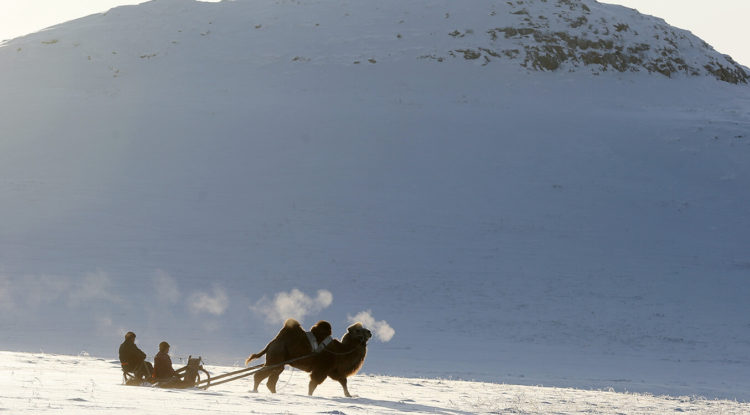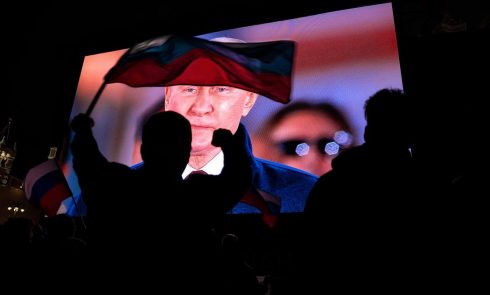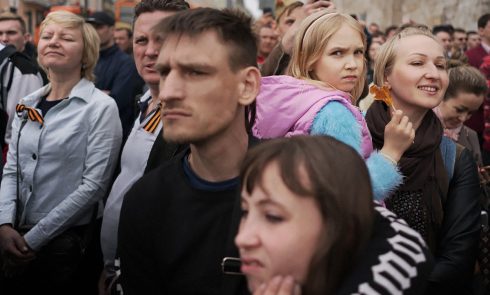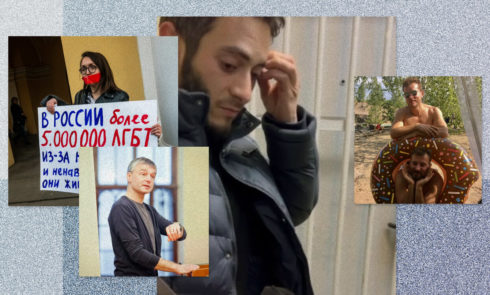In recent years and especially since the war began, the word “decolonization” has become one of the most topical political terms. Even Vladimir Putin uses it, trying to justify the invasion of Ukraine by decolonial motives. Meanwhile activists from the national republics of Russia have long argued that their regions are not equal subjects of the federation, but colonies of the “Moscow metropole.” Decolonial activist, writer, and author of the “Republic speaking” podcast Dankhayaa Khovalyg tells Holod why she considers her native Tyva a colony of Russia, and offers a strategy for its liberation.

It seems that the term “decolonization” is literally everywhere nowadays. Kremlin propagandists, Russian oppositionists and political analysts use it as a synonym for “achieving independence,” the well-meaning white experts write about the “side effects” of decolonization, explain how Vladimir Putin understands it, and generally confuse their readers as best they can. For me, a decolonial activist from the Tuva Republic, the word “decolonization” has an applied meaning. It is not a buzzword, but a way to rediscover one's home and attain inner freedom.
I should note that the term “decolonization” does not necessarily imply political independence but it definitely entails decentralization and an end to the “center/metropole-colony/region” relationship. It implies the removal of the control of the metropole over the region in the political, economic and administrative sense. This is a process that can last for decades or even longer.
Why Tyva is a colony and how it came to be this way
The Republic of Tyva is the youngest national region within the Russian state. The former Manchurian colony, known as the Uryankhaisk Region in Petrograd (old name for St. Petersburg—ed. Holod) and Moscow, gained independence after the fall of the Manchurian Qing dynasty in China in 1912. In 1921 it declared itself the sovereign state of Tannu-Tuva (Tuva National Republic). The sovereignty of the new state was not recognized by most countries of the world, which continued to consider Tuva a part of China. Only the bordering Mongolia and USSR supported the TNR.
Sovereignty, however, proved to be short-lived, and the Soviet recognition proved to have been hypocritical. A few years later, a group of future Tuvinian leaders loyal to Soviet authorities graduated from the (Stalin’s) Communist University of the Toilers of the East in Moscow. They subsequently seized power in the republic, launched the forced collectivization of the nomadic Tuvinian people as well as the processes of Russification, atheization, and Sovietization in general to prepare the country for the unification with the USSR premeditated by the Russian Communist Party of Bolsheviks and the Comintern.
Those leaders of the TNR who did not support the newly formed Tuvan People's Revolutionary Party and Stalin's policies were executed; all the feudal lords, the rich, and those who dissented were repressed.
In 1941, the TNR was the first foreign country to enter World War II on the side of the USSR by declaring war on Germany. In 1944, the Soviet Union accepted a petition for accession from the Tuvan revolutionaries, who by then had become rulers of the republic. Thus the TNR joined the Soviet Union as the Tuvan Autonomous Oblast within the Russian Soviet Federative Socialist Republic.
It’s been 79 years since then. Today, Tyva is one of the greenestregions of the country. It still has its incredible recreational potential: the mountains, taiga, steppes, tundra, sandy deserts, glaciers, medicinal springs, rivers and lakes. Tyva has its unique cultural heritage: artifacts of the ancient Yenisei runiform script, Scythian and Uighur ruins, and nomadic culture. There are many economic resources: mining industry, deposits of coal, gold, ores, rare earth metals, cattle breeding, and mineral water reserves. Tyva has an excellent social capital—one of the youngest populations in the country with a developed national identity and a high birth rate. And yet Tyva is one of the most economically depressed subjects of the Russian Federation with the lowest standard of living. Why would that be?
This unfair economic situation is in fact characteristic of colonies: it is not profitable for the metropole to develop lands which it considers subordinate to itself. Especially those with a national identity different from that of the metropole. When we look at it through the colonial lenses, it makes sense, because a region cannot secede or rebel if its inhabitants are constantly preoccupied with basic survival because the metropole drains resources from it.
Why we flee and how we feel in Moscow
When I left to pursue higher education “beyond the Sayan Mountains”—in greater Russia—I realized that I would most likely not return home. A region that was dying out economically, had high unemployment rates, extremely low salaries, weak infrastructure, which was partially non-gasified and non-electrified... What would I be doing there?
The school system encourages emigration from the republic. The Tuvan language and Tuvan literature are optional subjects. More and more parents don't choose these subjects so as not to burden their children on top of the compulsory school curriculum. I see their point: if, having graduated from the 11th grade, the children are likely to leave for big cities in Russia, they will not use their native language there, but Russian, preferably without an accent (so that they are bullied less), is absolutely necessary. They will be called “narrow-eyed”, “chinks”, “migrants”, “churkas” (a Russian ethnic slur for people from Caucasus, Central Asia and the Far East—ed. Holod) , they will be denied rental apartments more often because of the “only for Slavs” listings, the police will stop them more often in the street for random checks, their names and surnames will be changed or replaced by simpler ones anyway. So at least let them not be bullied for their accent.
When I left to pursue higher education “beyond the Sayan Mountains”—in greater Russia—I realized that I would most likely not return home. A region that was dying out economically, had high unemployment rates, extremely low salaries, weak infrastructure, which was partially non-gasified and non-electrified... What would I be doing there?
The school system encourages emigration from the republic. The Tuvan language and Tuvan literature are optional subjects. More and more parents don't choose these subjects so as not to burden their children on top of the compulsory school curriculum. I see their point: if, having graduated from the 11th grade, the children are likely to leave for big cities in Russia, they will not use their native language there, but Russian, preferably without an accent (so that they are bullied less), is absolutely necessary. They will be called “narrow-eyed”, “chinks”, “migrants”, “churkas” (a Russian ethnic slur for people from Caucasus, Central Asia and the Far East—ed. Holod) , they will be denied rental apartments more often because of the “only for Slavs” listings, the police will stop them more often in the street for random checks, their names and surnames will be changed or replaced by simpler ones anyway. So at least let them not be bullied for their accent.
Because I did not speak my native language very well, I felt disconnected from my native culture and people, including those close to me. As a child I attended a “Russian” kindergarten, which was considered the best in the city because of the good funding, then a “Russian” class in school with the most respected homeroom teacher, who was, of course, also Russian. That's how Russian replaced my native Tuvinian. My parents didn't read me Tuvan fairy tales before bedtime, instead they read Russian ones. The whole family watched Russian movies with the Slavic-looking characters. We read works of the “great Russian literature” in class. We dreamed of going to Moscow or St. Petersburg and getting into MSU or some other prestigious university.
Our parents worked tirelessly so that we could move to a big city for the better prospects, and we did our part—by studying diligently and dreaming of getting state-subsidized placement in a top university which would help us find our place under the sun.
It turns out that this sun shines differently on different people. People like me regularly face systematic racial and ethnic discrimination in Russia, which is manifested even in the little things: for example, because of your “complicated” name, a university professor, afraid to embarrass himself or you, would simply ask the other person. And the not-so-little things, like when a Tuvinian newborn and his mother are bullied on the Internet just because it happened to be the first baby born in St. Petersburg in 2023 (rather than an ethnic Russian—ed. Holod).
Or when a Buryat woman in Voronezh cannot rent an apartment because “we don't let Asians or Buryats in.” Or when a fifth-grader in Tyumen is banned from classes for wearing a hijab. Not to mention the numerous cases of murder and beatings of non-Russians by neo-Nazis. Here are some examples: a nine-year-old Tajik girl, a Buryat, a Tuvan, a Korean, an Uzbek, a Kyrgyz, a Kalmyk. Those are the decades of pain and fear that still reverberate in the collective trauma for many non-Russian peoples in this country.
And then there are the cases of exoticization and sexualization of the n-Russian (especially non-white) women and the “glass ceiling”, ubiquitous among all genders if you are an ethnic minority.
The reality in which we exist puts it clearly: ourselves, our indigenous languages and cultures, and our national republics are not equal to the Russian people, the Russian language and culture, to the so-called Russian regions.
Colonization is poverty. Poverty is colonization
Let’s look at the basic definition of decolonization: “removing the metropole’s control over a region in the political, economic and administrative senses.” It means that a region can be called a “colony” if it is dependent on the metropole, has no political or economic power, and is governed in a special way so as to not grant citizens of the colony rights comparable to those of citizens of the metropole.
For me, decolonization begins with the difficult questions. The question of equality: why do I sometimes feel that I have unequal rights with the Russians? The question of poverty: why did it happen that a region with such great potential for development and prosperity became the poorest and most disadvantaged place in the country? The question of identity and home: What was the point of returning to Tuva?
There can be no equality where there is control. Neither can there be development, prosperity, healthy love or respect. These seem to be pretty obvious things, but these things are the very things at the core of decolonization.
The colonial regime, after the land is subjugated, is based on the domination of the culture of the metropole—when it becomes more advantageous for the inhabitants of the colonies to use the titular language and join the dominating culture. It becomes favorable economically—they need to provide themselves and their families with better living conditions, because the quality of life is much lower in colonized regions,and psychologically, as they do not want to face the bullying and discrimination.
After all, I didn't choose not to know the Tuvan language. I didn't choose to be cut off from my roots at some point. I didn't choose to feel the semi-conscious relief when my classmates in Moscow would tell me, “But you're one of us! You speak Russian perfectly without an accent, you know Russian history and literature, you love Russian cuisine, you grew up in Russian culture. You're definitely Russian on the inside!” I do not remember what my response was on such occasions. I would say something vague, like, well, it’s something like that, yes. Now, being increasingly more immersed in decolonial activism, I can finally answer these questions freely and easily: no, I am not Russian. Men—Tyva men.
I recently spoke with activists from Buryatia, Kalmykia, Kazakhstan, and Kyrgyzstan as part of a media project. We were asked to briefly explain what “colonization” meant to us. The answers were different: “oblivion”, “erasure of the people”, “loss of dignity”, “destruction of memory”... The words varied depending on the responder’s region of origin.
In Kalmykia, for example, the Kalmyk language is barely spoken, which is a serious problem for people there. It is a consequence of the 1943 ethnocide, when all Kalmyk families were separated and exiled to Siberia. Buryatia is not doing so well with their national language either, but there it is part of a larger problem, the preservation of Buryat identity, as in the 20th century the lands of the indigenous people were divided and given to the different administrative subjects. In Kazakhstan, despite 30 years of independence, the influence of the Russian language and Kremlin policies and interests is still strong. In Kyrgyzstan, all archives concerning Soviet-era repression and the deportation of Kyrgyz men and women to Ukraine in the 1930s are still classified.
My answer to the question of what colonization is was “poverty.” The Tyva Republic is poor, catastrophically poor, despite all its resources and potential for development. And this is the clearest indicator of what a colony is for me. We must regain our economic agency together with the sense of our personal responsibilities. We must regain control of our own lives. It's obvious: if things remain as they are, if the imperial regional exploitation machine maintains the momentum it has built up so far, there will be no future for Tyva. The republic's low position in the federal ratings in terms of quality of life, wages, unemployment, criminalization, child poverty, and alcoholism is the result of colonial policy. We have never lived worse than we do today.
My personal decolonization
It’s time for decolonization. It must begin with the simplest steps. With studying national history, the history of one's family, the stories of the older relatives about their past. And then we must demand the edits to the Russian school textbooks—for the history of the regions to be taught objectively and with respect for these regions.
Decolonization begins with regaining your own sense of self-worth—for example, not being too shy to correct someone who misspelled your name again. Get people to stop using offensive words: “narrow-eyed,” “churka,” “khach” (racial slurs widely used in Russia—ed. Holod) and so on.
Decolonization begins with your personal contribution to the preservation of your national culture and language. This is how I began learning the grammar of the Tuvan language using a textbook, so I could speak and correspond only in Tuvan with some of my friends and relatives.
Lastly, if you have enough strength, you can raise the difficult, uncomfortable questions concerning your region. For example, the closed archives of the times of repression of the Arats (nomadic herders—ed. Holod), the clergy and their families. The situation with the Tuvan language at schools. The pollution of the environment caused by the mining and processing plants owned by Longxing, a Chinese company operating in Tuva. And the very fact that Tuvinian lands are rented out to Chinese investors for the industrial plants.
Or how about asking why Tuvinian men go to fight in Ukraine for the sake of the “Russian world.” The very same one in which we are considered to be “un-Russians” and “unwanted aliens.”




